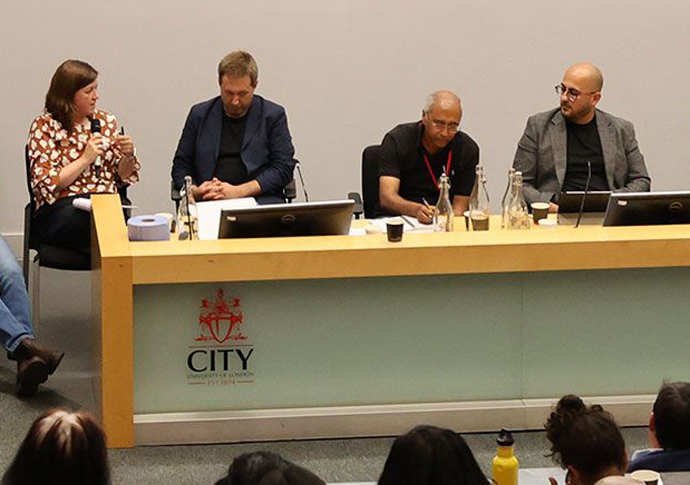Uni asks: Are we in a polycrisis?
Overlapping problems mean things are ‘grim’ – but it’s not the end of the world
Friday, 5th July 2024 — By Charlotte Chambers

The launch of the new Finsbury Institute at City University
IN case you were wondering just how bad things have got, a professor at City, University of London, who recently opened a new think tank at the Clerkenwell campus by chairing a discussion on the state of the world, has the answer.
“I do try to allay my students’ anxiety to the extent that I can,” admits Professor Inderjeet Parmar, associate dean for research at the School of Policy and Global Affairs and an expert on ‘‘polycrisis” who has lectured at City since 2012.
“But things are pretty grim.”
Just how grim they are will be one of the many topics investigated by the new Finsbury Institute at the university, which opened last month to connect research on social science. Its aim is to translate research into policy.
In a debate on the opening night, labelled Polycrisis Interrogated, they examined whether we are in a New Cold War and discussed whether the public has lost trust in the government due to social media.
Those on the panel included an economist, a criminologist, a political scientist and numerous academics, and the Lord Mayor Michael Mainelli, Rector of City, opened the event.
While Professor Parmar wouldn’t necessarily agree we are living in unprecedented times, he did accept that “there are more drivers of crisis in the world today than there probably have ever been”, which means it’s harder than ever to find our way back from them.
Polycrisis, a relatively new term which came into existence around five to seven years ago within business circles, means, unsurprisingly, “numerous crises”.
They can come in many forms, be it economic, political, cultural or otherwise, but what makes them more problematic is that they overlap and interconnect.
“The intersection of them is actually qualitatively more problematic than if they were occurring singly,” he says.
Reassuringly, Professor Parmar doesn’t think the world is about to end.
“I have a theory of world politics,” he says, which goes something like “although countries are arming themselves with nuclear weapons at an alarming rate, an understanding that they can annihilate the world is very present”.
Armageddon, he argues, is unlikely, and he “wouldn’t go that far” when speculating on the possibility of World War Three, but he does have bleak predictions should Donald Trump win the November elections in the United States – a race he says is “too close to call”.
“The biggest kind of danger,” he says, is Trump’s pledge to “be a dictator on day one,” should he be handed back the keys to the White House. Trump, he says, will do two things: ban immigration and “burn all the regulations for oil and gas”.
And if he had to blame the root of the polycrisis on one thing, he says it would fall at the feet of big business and its stranglehold over governance. But it’s a catch-22 situation as politicians also need businesses – so he can’t see a way out at this point. It is, he argues, behind the increasing number of people refusing to vote.
Unexpectedly, he finds a silver lining in climate change. “That is a kind of common global threat to humanity as a whole and therefore, drives people together, to try to do something about it,” he says.